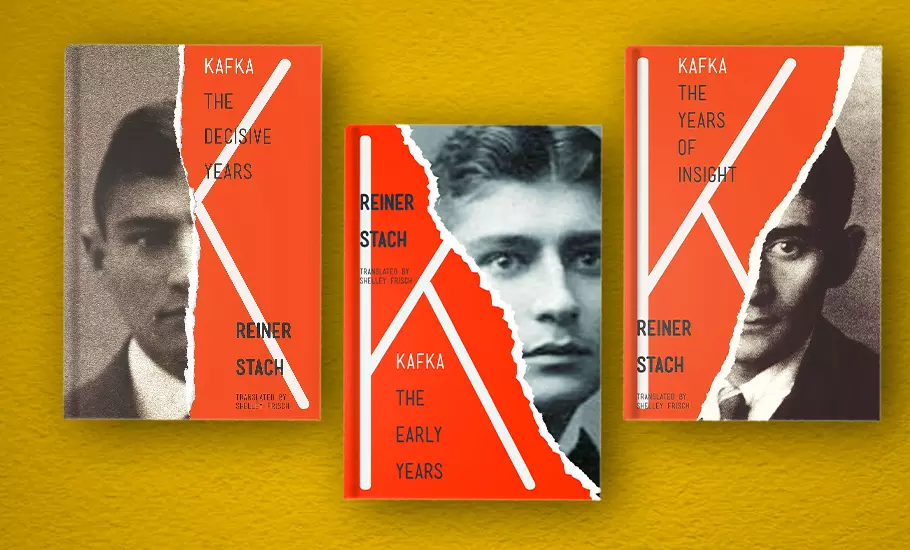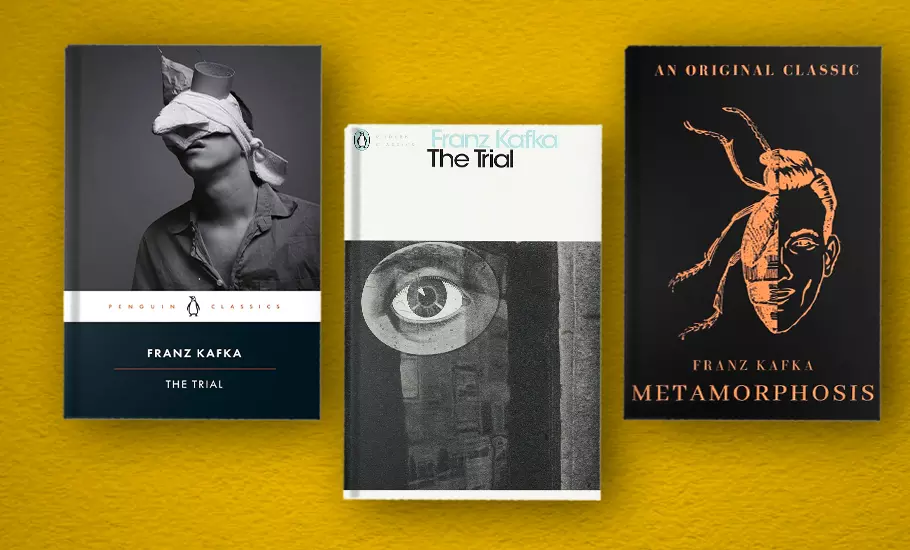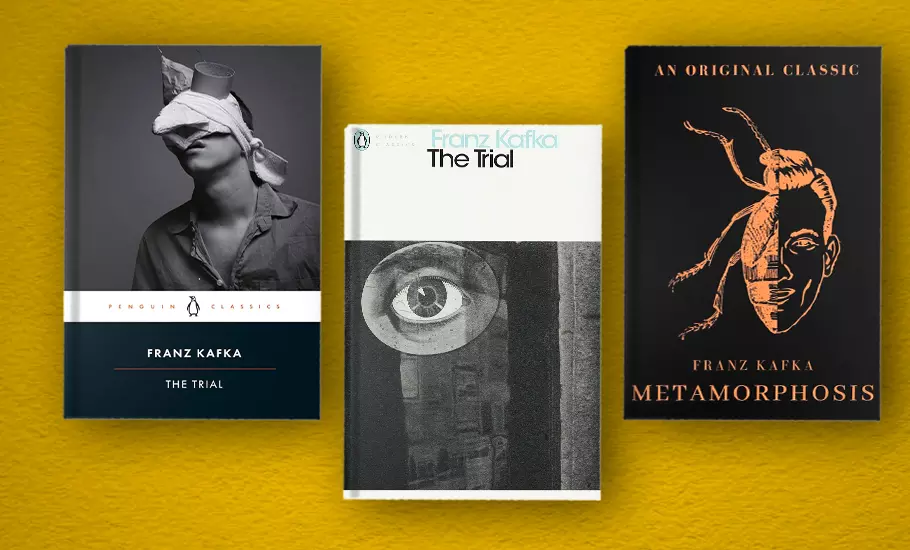
- Home
- India
- World
- Premium
- THE FEDERAL SPECIAL
- Analysis
- States
- Perspective
- Videos
- Sports
- Education
- Entertainment
- Elections
- Features
- Health
- Business
- Series
- In memoriam: Sheikh Mujibur Rahman
- Bishnoi's Men
- NEET TANGLE
- Economy Series
- Earth Day
- Kashmir’s Frozen Turbulence
- India@75
- The legend of Ramjanmabhoomi
- Liberalisation@30
- How to tame a dragon
- Celebrating biodiversity
- Farm Matters
- 50 days of solitude
- Bringing Migrants Home
- Budget 2020
- Jharkhand Votes
- The Federal Investigates
- The Federal Impact
- Vanishing Sand
- Gandhi @ 150
- Andhra Today
- Field report
- Operation Gulmarg
- Pandemic @1 Mn in India
- The Federal Year-End
- The Zero Year
- Science
- Brand studio
- Newsletter
- Elections 2024
- Events
Kafka at 100: The ominous parallels between power and oppression

“Someone must have slandered Josef K., for one morning, without having done anything wrong, he was arrested,” reads the opening sentence in Franz Kafka’s The Trial — among the most famous first sentences in the history of literature. The Trial is one of the three novels (The Castle and Amerika are the other two) written in German that Kafka, who died at the age of 40, had left...
“Someone must have slandered Josef K., for one morning, without having done anything wrong, he was arrested,” reads the opening sentence in Franz Kafka’s The Trial — among the most famous first sentences in the history of literature. The Trial is one of the three novels (The Castle and Amerika are the other two) written in German that Kafka, who died at the age of 40, had left unfinished; they were published by his friend, biographer and literary executor Max Brod, who had ignored Kafka’s instructions to burn them in the larger interest of the readers around the world. Though constructed as a fantastic allegory, The Trial seems to be way too close to reality in the India of 2024, where the shadow of authoritarianism looms large. As we commemorate 100 years of his death this year, Kafka’s literary legacy seems to pulsate with renewed relevance; his tales of absurdity, alienation, and the incomprehensible machinations of power resonate with a chilling clarity that cuts to the bone.
The opening scene in The Trial, an overwhelmingly complex novel, is ominous, and ludicrous. When K. wakes up, he notices that he is being observed through the window by an old lady who lives across the way; she is later joined by others. They just keep staring at him. K. is ‘on stage’ right from the beginning. It can be seen as a symbol of surveillance, a central theme of the book, in which there is no courtroom scene — a novel about the trial could surely do with one or two — in which the issues are dissected threadbare by lawyers before a judge.

Once Josef K. is arrested by two guards, named Willem and Franz, an examining magistrate inquires into the case against him and hearings are held. The court is a vast, impenetrable and invisible organisation, where the highest judges remain inaccessible. The warders are not authorized to reveal the reason of K’s arrest and no charge against him is ever formulated. The real trial, we discover, is elsewhere. There are many ways of reading the novel; in one reading, it can be seen as a ‘trial against the court’ — Kafka gradually exposes the court to be relentless, and malicious.
The world Kafka, inarguably one of the major literary figures of the 20th century, portrays in The Trial, as indeed in his other notable works, like The Metamorphosis, is eerily reminiscent of the nightmarish reality of the times we live in. The Trial was published posthumously on April 26, 1925. But Kafka, who was born in Prague, where his parents, Hermann and Julie Kafka, ran a small shop that sold fancy goods, wrote it at a time when the world was teetering on the brink of unprecedented upheaval; World War 1 had already broken out. The main female character, Fräulein Bürstner, in The Trial is referred to as ‘F.B.’ in Kafka’s manuscript; the abbreviation forms the initials of his fiancée Felice Bauer, whom he had met in August 1912. She lived in Berlin, and they had a long-distance affair as Kafka began to correspond with her regularly. Kafka, however, had misgivings about the marriage; it would take away the solitude that he needed to write.
The first section of The Trial ends with Joseph K. sexually assaulting his neighbour, Fräulein Bürstner, by repeatedly kissing her without her consent. In the last chapter, K. is executed exactly a year after his arrest. The fact that the power of the court — like all political power — rests ultimately on violence is depicted in the lumber-room scene, where the two guards are thrashed — a brutal punishment for their misdemeanours. The thrasher, who has little qualms about what he is doing, performs his job as unfeelingly as a guard in the concentration-camp of Nazi Germany: ‘I’m employed as a thrasher, so I’ll thrash them’. K. is executed in a lonely quarry in an even more barbaric fashion: two executioners plunge a knife into his heart. As K. is being led to his execution, he tries to resist his executioners. But when he sees a figure (she is not Fräulein Bürstner, but resembles her strongly) appear in front of him, K. immediately feels that his resistance is pointless.

Throughout the novel, Kafka employs a range of literary techniques to convey the sense of dislocation and alienation experienced by Josef K., inviting us to grapple with the theme of guilt, responsibility and freedom. At its core, The Trial can be seen as an exploration of the existential predicament faced by modern individuals in a world that appears increasingly indifferent and incomprehensible. Through Josef K.’s futile attempts to navigate the opaque, arbitrary bureaucracy of the court, Kafka exposes the inherent absurdity of systems of power and authority. One of Kafka’s most remarkable achievements in The Trial is his evocation of a sense of existential unease and ambiguity. Replete with vivid and haunting imagery, from the labyrinthine corridors of the court to the bizarre rituals and ceremonies that Josef K. encounters on his journey, the prose is marked by its precision and economy, conveying a wealth of meaning through seemingly mundane details and subtle shifts in tone. When the novel ends, with Josef K.’s abrupt and inexplicable execution, we are left with more questions than answers.
The genius of Kafka lies in the fact that he showed us where we were headed over a century ago, with great accuracy. A lawyer, he was employed for years by a semi-governmental organisation that regulated the new industries and factories in Central Europe; he was also tasked with handling the disability benefits to workers maimed in their machines. In one of his most famous stories, ‘In the Penal Colony,’ he describes a horrendous execution machine, drawn perhaps from his memory. Kafka is a writer who understood the tentacles of bureaucracy (he tells us how the locus of evil in modern societies lies within the levers of its bureaucracies) and law from the inside. The Trial has been read as a study of political power, a pessimistic religious parable, or a crime novel where the accused man is himself the problem. Josef K. succumbs to psychological pressure, faced with ambiguous but scary scenarios. His life story remains obscured by myth and misinformation; there are few books that will help you grasp his life and times in a holistic manner. In this regard, Reiner Stach’s three-volume biography, translated from the German by Shelley Frisch, is a treasure trove.

In Kafka’s universe, the individual is reduced to being a helpless pawn in the face of unyielding institutions. In The Castle, for instance, the protagonist makes several fruitless attempts to communicate with the authorities who are assumed to occupy the castle overlooking the village. It’s a sentiment that strikes a disquieting chord in a country where personal freedoms are increasingly curtailed, dissent stifled, and voices of opposition silenced. The parallels between Kafka’s fictional world and the grim realities of contemporary India are haunting, to say the least.
